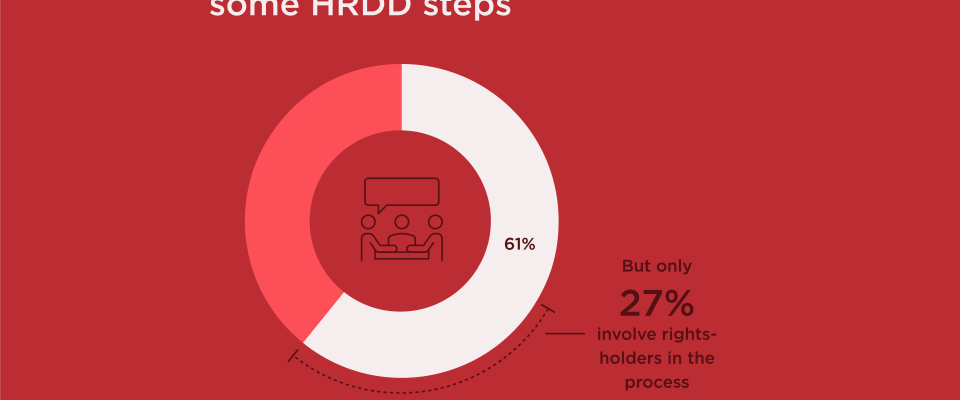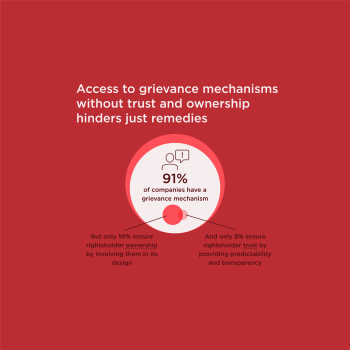Key finding
Most companies fail to include rightsholders in their human rights due diligence processes

Carrying out a human rights due diligence (HRDD) process allows companies to figure out how their actions are affecting and might affect people and take steps to prevent or redress any negative impacts. As a process that is fundamentally about companies’ impact on people, it is crucial that those that are or might be affected by the company, often referred to as ‘rightsholders’, have a say in this process. Yet, even though most companies are doing some form of HRDD, they often fail to involve the people who might be affected. 61% of extractive and apparel companies now show that they are taking one or more HRDD steps, up from 51% in 2018. However, only 27% provide evidence of consulting their rightsholders as a part of this process. Effectively, this means that more than half (55%) of the HRDD processes we assessed did not include any evidence rightsholder consultation.
Consulting rightsholders is a process that allows individuals and communities who may be affected by a company’s activities to express their concerns, needs and issues directly. This approach centres inclusivity and participation, empowering rightsholders to contribute to and influence the decisions and actions that directly affect their lives. When companies truly involve rightsholders, it builds trust, makes the company’s decisions more legitimate, and helps find sustainable solutions between a company and its rightsholders. But it’s not just about doing the right thing; it’s also about making smart decisions. If a company doesn’t listen to rightsholders’ perspectives and concerns regarding decisions and actions that affect them, they might miss important information about what’s happening on the ground and the risks they face.
While companies have inspired innovation and helped to strengthened society in myriad ways throughout history, their unregulated activities have also caused untold harm to communities. It is heartening to note that some companies are recognising the need to engage with rightsholders meaningfully and looking to factor-in their opinions and experiences in company decision making.
Early-stage rightsholder participation, built into the conception of business-strategy, maximises benefits for both communities and businesses. A strong and sustained partnership between communities and businesses can recharge economies and could take humankind towards a more equitable future.
– Gopinath K. Parakuni, Founder and Director of Cividep India
The fact that more than half of HRDD processes lack evidence of input from and perspectives of those directly impacted raises concerns about how effective and valuable these processes and their outcomes are. To make HRDD reliable and trustworthy for guiding a company’s actions to prevent negative impacts, it’s paramount to listen to rightsholders and use their insights to make decisions. This doesn’t just make for better ethical practices, it also helps companies handle human rights challenges in a more informed and responsible way. This is reflected by practices of the top ten companies, they all involve rightsholders in their HRDD process while only 20% of the other 100 companies do.
